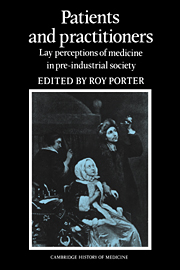Book contents
- Frontmatter
- Contents
- 1 Introduction
- 2 Murders and miracles: Lay attitudes towards medicine in classical antiquity
- 3 Puritan perceptions of illness in seventeenth century England
- 4 In sickness and in health: A seventeenth century family's experience
- 5 Participant or patient? Seventeenth century childbirth from the mother's point of view
- 6 Piety and the patient: Medicine and religion in eighteenth century Bristol
- 7 Cultural habits of illness: The Enlightened and the Pious in eighteenth century Germany
- 8 ‘The doctor scolds me’: The diaries and correspondence of patients in eighteenth century England
- 9 Prescribing the rules of health: Self-help and advice in the late eighteenth century
- 10 Laymen, doctors and medical knowledge in the eighteenth century: The evidence of the Gentleman's Magazine
- 11 The colonisation of traditional Arabic medicine
- Index
6 - Piety and the patient: Medicine and religion in eighteenth century Bristol
Published online by Cambridge University Press: 19 October 2009
- Frontmatter
- Contents
- 1 Introduction
- 2 Murders and miracles: Lay attitudes towards medicine in classical antiquity
- 3 Puritan perceptions of illness in seventeenth century England
- 4 In sickness and in health: A seventeenth century family's experience
- 5 Participant or patient? Seventeenth century childbirth from the mother's point of view
- 6 Piety and the patient: Medicine and religion in eighteenth century Bristol
- 7 Cultural habits of illness: The Enlightened and the Pious in eighteenth century Germany
- 8 ‘The doctor scolds me’: The diaries and correspondence of patients in eighteenth century England
- 9 Prescribing the rules of health: Self-help and advice in the late eighteenth century
- 10 Laymen, doctors and medical knowledge in the eighteenth century: The evidence of the Gentleman's Magazine
- 11 The colonisation of traditional Arabic medicine
- Index
Summary
In the concluding chapter of Religion and the Decline of Magic Keith Thomas describes the ‘decline of magic’ after 1660, replaced by a range of practical, scientific and medical methods to counter, or at least mitigate, the uncertainties of life, amongst which illness was the most persistent. Historians of medicine have generally endorsed Thomas' view that medical remedies grew in importance in the eighteenth century, at the expense of religious or magical means of healing. In and around the towns at least the qualified medical man replaced the minister as the chief healer, whilst patent medicines, endorsed by medical men, proliferated at the expense of home-made cures. In the key areas of witchcraft and mental illness moral and religious explanations of disease gave way, in official circles at least, to more secular, materialistic accounts. Thomas suggests that such developments resulted in a widening gap between popular and elite notions, as the rural poor clung to their traditional remedies and magical beliefs, now dismissed as vulgar superstitions by the educated.
Thomas and other historians have been more confident in describing this process than in explaining it. Thomas rightly dismisses the notion that medicine or science had decisively demonstrated their superiority, concluding that ‘in medicine as elsewhere, therefore, supernatural theories went out before effective techniques came in’. Thomas is forced to suggest, tentatively, a revolution of aspirations, linked to a new scientific worldview.
- Type
- Chapter
- Information
- Patients and PractitionersLay Perceptions of Medicine in Pre-industrial Society, pp. 145 - 176Publisher: Cambridge University PressPrint publication year: 1986

